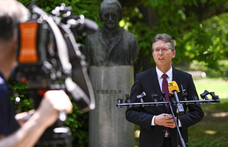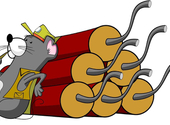It's commonplace with Democratic countries that reporting on international affairs is more balanced and objective than that on domestic affairs. But faced with the Austrian press we have to concede that there are exceptions. Die Presse and Der Standard show few signs of objectiveness and balance. In their reports, there is the unmistakable whiff of cold civil war.
Let's look at some of these newspapers' claims. "Viktor Orban is playing a dangerous game by using political slogans to fire up young people who are prepared to violence," according to Die Presse, emphasising that "two elements combined to produce Thursday's riots. One was a part of Hungarian youth, mostly from the capital, which is radical and ready to commit acts of violence. The other element was the leader of the conservative opposition, who furnishes political slogans in support of the destructive actions of the young right-wing radicals." It's like reading the leader page in our own left-wing daily Nepszava. Of course, it's hard to deny the Fidesz leader's moral responsibility for the escalation of the situation that confronts us. There is no question that Orban has made gestures towards the extreme right, most recently by calling for the rehabilitation of the Arpad Flag, and he has shown few signs of being a centrist statesman entirely opposed to the extremists. It is also likely that some of his "direct actions" (boycotting the prime minister's speeches in parliament, a permanent street presence, the notorious dismantling of the crowd `control barriers on Kossuth ter) have gone too far.
But we should not forget one thing. However questionable his decisions, the leader of the largest opposition party has never called openly for violence. Orban is no stranger to ambiguous statements, but his speeches never call for unrestrained aggression. That "the government can be bundled off" is a statement that can be interpreted in many ways, including the assumption that we should attempt to dismiss it using democratic means. We can hardly hold it against an opposition politician if he tries continuously to bring down the government in power. That Orban wants to bring down the government does not mean he would go as far as to employ violence or that he shares the same goals as those protesting on the streets. If a politician makes gestures towards militant voters, this does not mean he is legitimising, still less strengthening, attempts to stretch the limits of constitutionality.
Further, it is deeply unhealthy to see people as mere puppets without any independent will, directed entirely by their politicians. This is a vision frequently evoked by polemicist journalists - if politician X says this, they say, then the crowd must have followed them. Why can we not accept that citizens exist as a community of individuals with individual responsibility and free will? That they themselves are responsible for their actions? That any society has its handful of extremists who need no encouragement to riot? Who will riot for no other reason than that they are frustrated, tortured by sickly neuroses?
You can also dissent from the paper's claim that "since 1989 left-liberal governments in Hungary have made serious mistakes. But Orban's 1998-2002 government shares just as much responsibility for the country's economic and budgetary pains." There's no question that the Right bears great responsibility for the current situation. But to say that its burden is just as great, to the nearest milligram, is also questionable. There is no doubt that, with executive power in its hands, Fidesz failed to take reformist steps that had been continuously delayed since the regime change. They certainly spent irresponsibly and accounted creatively. But it wasn't Viktor, but Peter Medgyessy who implemented unrealistic campaign promises. By raising public sector wages by 1.5 times, by introducing a 13th monthly pension he wrecked the budget. Medgyessy led the most populist government in Hungary's history. He didn't just promise with abandon, he went through with those promises. Just because the Right is unappealing, that doesn't mean you should accuse them of mistakes they never made. Certainly, the opposition's demagoguery is making it harder to swallow the bitter pill. But for that we shouldn't pity the very people whose four years of dilettante government brought the country into its current situation.
"For as long as Orban continues to flirt with the extreme right and its symbols, Hungary will not see peace," Der Standard concludes. There may even be some formal truth to this. But it's too one-sided. How could Orban place his relationship with the far right beyond suspicion? By saying, "I'm no longer talking to you. You have nothing to do with me." Morally, this would be entirely correct. But let's be honest: in the current political atmosphere, what could push Orban into doing this? Has the Socialist Party kicked out its old functionaries, the informers, the party officials who read the informers' reports? Has it kicked out the people who did not just dream of anti-democratic power, but actually created a real dictatorship? If the Socialists cannot exclude its own guilty secrets, then how can it expect the other side to do so?
A socialist-liberal coalition is now in its second term of government. It seems excessive of our Austrian neighbours to blame exclusively those who are now out of power for the current unrest.
Laszlo Tamas Papp















